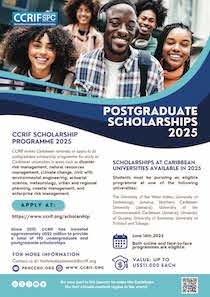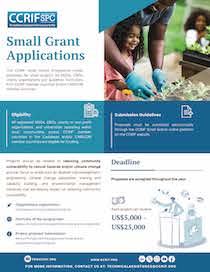Grand Cayman, Cayman Islands, March 25, 2013 – On Monday 25th March 2013, the Caribbean Catastrophe Risk Insurance Facility (CCRIF) opened its 2013 Extra-Regional Scholarship application process.
Through its Scholarship/Professional Development Programme of the wider CCRIF Technical Assistance (TA) Programme, CCRIF is providing a maximum of two scholarships annually for citizens of CARICOM member countries and/or CCRIF member countries who are desirous of pursuing a Masters or an MBA programme in one of the areas identified below which are not available at regional universities but which are available at universities in the United Kingdom, United States or Canada:
- (Catastrophe) Risk Management
- Property/Casualty Insurance
- Climate Change
- Other hazard/disaster related disciplines
- MBA programme with a major in risk management and/or insurance or a related field
The scholarships are valued at a maximum of US$40,000 each and are specifically for those applicants who would have gained admission to a Masters level programme or an MBA programme fitting the eligibility criteria presented above.
Last year, CCRIF provided two extra-regional scholarships to students to pursue a Masters in Public Administration in Environmental Science and Policy at Columbia University in the USA and an MSc in Climate Change and Development at the University of Sussex in the UK.
CCRIF’s TA Programme has been developed to help countries in the region deepen their understanding of natural hazards and catastrophe risk and the potential impacts of climate change. The scholarship component of the TA programme is designed to assist with the creation of a cadre of professionals who can play a key role in developing national and regional strategies that will lead to improved disaster risk management and increased climate change resilience.
Since 2010, CCRIF has awarded nineteen scholarships to students either through its Extra-Regional Scholarship Programme, its University of the West Indies (UWI)-CCRIF scholarship programme or through its cooperation with member countries and regional organisations. Total disbursements to date are in excess of US$200,000.
CCRIF believes that building capacity in catastrophe risk management at the individual level through support for education will ultimately contribute to the main objective of its overall technical assistance programme helping countries in the region deepen their understanding of natural hazards and catastrophe risk and the potential impacts of climate change.
This CCRIF website provides information on the scholarship programme, including eligibility criteria, value of scholarships, application requirements and selection criteria. Applications for the extra-regional scholarship programme must be submitted via the CCRIF website at: https://www.ccrif.org/extra-regional-scholarship no later than April 20, 2013.
For additional information or for clarification, please email us at: ccrifscholarships@ccrif.org
About CCRIF: CCRIF is a not-for-profit risk pooling facility, owned, operated and registered in the Caribbean for Caribbean governments. It is designed to limit the financial impact of catastrophic hurricanes and earthquakes to Caribbean governments by quickly providing short-term liquidity when a policy is triggered. It is the world’s first regional fund utilising parametric insurance, giving Caribbean governments the unique opportunity to purchase earthquake and hurricane catastrophe coverage with lowest-possible pricing. CCRIF represents a paradigm shift in the way governments treat risk, with Caribbean governments leading the way in pre-disaster planning. CCRIF was developed through funding from the Japanese Government, and was capitalised through contributions to a multi-donor Trust Fund by the Government of Canada, the European Union, the World Bank, the governments of the UK and France, the Caribbean Development Bank and the governments of Ireland and Bermuda, as well as through membership fees paid by participating governments.
Since the inception of CCRIF in 2007, the Facility has made eight payouts totalling US$32,179,470 to seven member governments. All payouts were transferred to the respective governments less than a month (and in some cases within a week) after each event.





